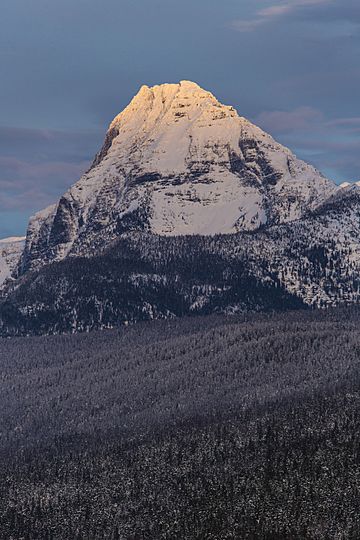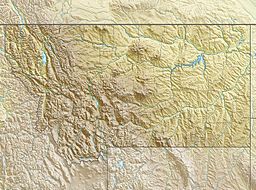Edwards Mountain facts for kids
Quick facts for kids Edwards Mountain |
|
|---|---|

Edwards Mountain sunset
|
|
| Highest point | |
| Elevation | 9,076 ft (2,766 m) NAVD 88 |
| Prominence | 1,072 ft (327 m) |
| Geography | |
| Location | Flathead County, Montana, U.S. |
| Parent range | Lewis Range |
| Topo map | USGS Lake McDonald East, MT |
| Climbing | |
| First ascent | Unknown |
Edwards Mountain is a tall mountain in Montana, U.S. It stands about 9,076 feet (2,766 m) high! This mountain is part of the Lewis Range. You can find it inside Glacier National Park. It's located just west of a large ice area called Sperry Glacier.
Contents
What is Edwards Mountain Like?
Edwards Mountain is a big part of the beautiful Glacier National Park. It's known for its stunning views. The mountain is a popular spot for hikers and nature lovers. It offers amazing scenery and a chance to see wildlife.
What's the Weather Like on Edwards Mountain?
The weather on Edwards Mountain is usually very cold. It has what is called an alpine climate. This means it has long, very cold winters. The summers are short and can be cool or mild. Temperatures can drop far below freezing. Sometimes it feels like −30 °F because of the wind! This type of climate is common in high mountain areas.
How Was Edwards Mountain Formed?
Edwards Mountain, like other mountains in Glacier National Park, is made of sedimentary rock. This rock formed a very long time ago. It was laid down in layers from the Precambrian to the Jurassic periods. Imagine layers of mud and sand settling at the bottom of ancient seas. Over millions of years, these layers hardened into rock.
The Big Push: Lewis Overthrust
About 170 million years ago, something amazing happened. A huge geological event called the Lewis Overthrust began. This was like a giant push from deep inside the Earth. A massive slab of old rock, about 3 mi (4.8 km) thick, 50 miles (80 km) wide, and 160 miles (260 km) long, was pushed. This huge rock slab slid over much younger rock. This incredible force helped create the tall mountains we see today, including Edwards Mountain.
 | James Van Der Zee |
 | Alma Thomas |
 | Ellis Wilson |
 | Margaret Taylor-Burroughs |



